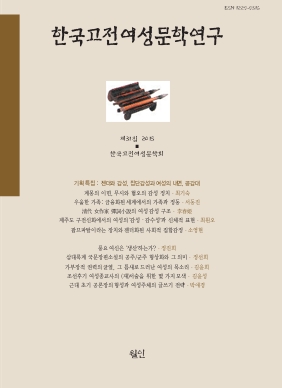여성의 불행감에 대한 정신분석적 이해
A Psychoanalytic Understanding of Women’s Sense of Unhappiness
- 한국고전여성문학회
- 한국고전여성문학연구
- 제33권
-
2016.125 - 35 (31 pages)
- 850

본 논문의 목적은 여성의 불행감을 정신분석적 관점에서 이해하고 설명하는 데 있다. 인간은 누구나 행복한 삶을 영위하기를 바라고 또 이를 추구한다. 하지만, 행복이란 상태는 좀처럼 정의내리기도 어렵고, 또한 그 행복에 도달하는 일은 지극히 어려운 일처럼 여겨진다. 오히려 인간은 불행감을 보다 더 쉽게 경험하는 듯 보인다. 인간은 자기 자신과 자신의 인생과 미래에 대해 불안감을 갖고 있으며, 그 전망에 대해 부정적인 관점을 채택하여 자신을 불행하다고 판단하게 된다. 그렇다면 이런 불행에 대한 느낌과 감정은 어떤 심리적 기제에 기원하고 있는가? 정신분석적 관점에서 보았을 때, 인간의 불행감은 인간이 현실 세계에 직면하며 경험하게 되는 갈등과 결핍에서 비롯된다고 볼 수 있다. 정신분석은 인간의 내적 세계를 갈등과 결핍이 일어나는 곳으로 묘사하고 있으며, 인간의 정신병리가 이런 갈등과 결핍에 의해 생겨나는 것으로 보고 있다. 인간의 불행감 또한 이런 정신분석적 갈등과 결핍이론에 근거했을 때, 보다 분명한 이해를 할 수 있게 되고, 그 해결방안을 모색할 수 있다. 프로이트에 따르면 인간은 갈등으로 인해 고통당한다. 선천적으로 주어진 욕동은 만족을 추구하지만, 문명세계에서 그 욕동은 충분히 만족될 수 없다. 특별히 프로이트가 이야기하는 성적이고 공격적 욕동은 현실 세계에서 포기되거나, 지연되어야 한다. 그렇기에 그가 바라보는 인간은 갈등 속에서 고통받는 존재이다. 다시 말해, 억압하려는 세력과 억압받는 세력 사이의 갈등 가운데 인간은 불행감을 경험할 수밖에 없게 된다. 다만 그 불행감은 신경증적인 불행감과 정상적인 불행감으로 나눠지며, 정신분석의 목적은 정상적인 불행감의 수준으로 불행감을 완화시키는 것이라고 말할 수 있다. 코헛에 따르면, 인간은 결핍으로 인해 고통당한다. 결핍은 자기 구조의 결핍을 의미하는 것으로, 인간이 특별하게 존중받고 싶고 인정받고자 하는 자기애적 욕구에 지속적인 좌절이 발생할 때 이런 결핍은 발생하게 된다. 코헛은 인간의 자기감은 혼자의 힘으로 고양될 수 없으며, 자기의 가치를 알아봐주고 존중하는 외부 대상과의 관계 속에서만 그 자기감은 향상될 수 있다. 그는 이런 대상을 자기대상으로 개념화시켰다. 그에 따르면, 자기대상 경험의 부재로 인해 자기감의 결핍이 초래되고, 이는 자기 자신과 자신의 인생에 대한 어두운 전망으로 이어져 불행감을 발생시킨다. 정신분석적 갈등과 결핍이론은 인간의 내적 세계와 외부 현실이 끊임없이 상호적으로 영향을 주고받는 것임을 보여준다. 정신분석적 갈등과 결핍이론에 근거했을 때, 여성의 불행감은 여성에 대한 지나친 억압과 불평등, 그리고 여성성에 대한 평가절하에서 발생하는 것으로 이해할 수 있다. 한국 사회에서 여성은 사회 경제적 측면에서 다양한 억압과 불평등을 받는다. 이는 여성 안에 내적 긴장과 갈등을 촉발하게 되어, 불필요한 억압으로 인한 신경증적 불행감을 경험한다. 한편으로 한국 사회에서 여성성은 평가절하의 대상이 될 때가 많고, 여성은 혐오의 대상이 되기도 한다. 이는 여성 안에 무의식적 결핍을 만들게 되고 이로 인해 여성들의 자기감은 더욱 떨어지게 된다. 정신분석적으로 여성에 대한 불행감에 접근하기 위해서는, 여성의 불행감에 대한 심층적인 분석과 이해가 선행되어야 한다. 정신분석적 일대일 상담에서는 여성을 불행에 빠트리게 한 상황을 상쇄시킬 수 있는 상담관계가 제공되어야 할 것이다. 하지만, 거기에 머무르지 않고, 여성의 내적인 심리 세계 안에 심한 갈등과 결핍을 유발시키는 사회구조와 환경에 때한 분석과 그 변화를 위해서도 노력해야 한다.
The purpose of this paper is to understand women’s sense of unhappiness in terms of psychoanalysis. Human beings attempt to enjoy a happy life, but it is difficult to learn not only what happiness is but also how to attain it. Rather, it is easy for them to feel unhappy about themselves and their life and future. Where does this sense of unhappiness come from? How can we explain this negative feeling in the psychoanalytic perspective? When unhappiness is seen in terms of psychoanalysis, it can be said that a sense of unhappiness originates in conflicts and deficits in our inner world to which psychoanalysis ascribes psychopathology. According to Freud, human beings suffer from inner conflicts between the repressing and the repressed. Every human being has sexual and aggressive drive which should be repressed to adapt themselves to the civilized society representing the repressing. In that sense, human beings are obliged to experience conflicts between the repressing and the repressed which leads to the sense of unhappiness. According to Kohut, human beings suffer from inner deficits which occur due to the absence of psychological support structure. In his view, human beings’ psychic motive lies in a sense of self which can be facilitated with the help of others. In other words, when others empathically respond to the needs of the self for its values and especialness to get accepted and confirmed, its sense of self is lifted. When the self experiences the empathic failure, it can be depleted. Based on these psychoanalytic theories of conflict and deficit, women’s sense of unhappiness is closed associated with repression and devaluation targeted to women and femininity. The repression and devaluation result in not only women’s inner tension and conflict but also lack of the sense of self. Women’s sense of unhappiness is caused by the deficit because of which women think of themselves as impoverished and inadequate. Psychoanalysis should be interested in taking care of not only women with the conflicts and deficits but also social structure producing them.
국문초록
1. 서론
2. 정신분석적 갈등이론
3. 정신분석적 결핍이론
4. 불행감의 근원
5. 갈등과 결핍, 그리고 여성의 불행감
6. 결론
참고문헌
Abstract
(0)
(0)